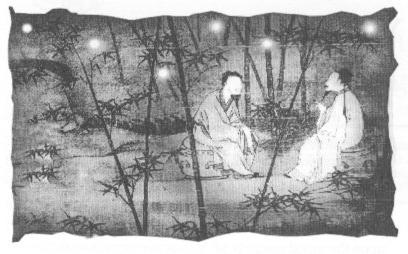陶淵明在飲酒的時候所想到的都是些什麼?他想到了「榮衰無定在,彼此更共之」,想到了「不賴固窮節,百世當誰傳?」他思自索的是「君子固窮」的操守。那些醉倒在街頭上的飲酒的人,能夠想到固窮的操守嗎?而陶淵明怎麼憑空地想到這樣多的人生問題呢?這不正是因為飲酒,才引出這些對於人生道理的思索考慮的嗎?
所以他詩裏所說的「有酒不肯飲」的酒,並非一般意義上的酒,而是一種引發觸動他思想活動的媒體。以前我引過蘇軾在陶淵明這組《飲酒》詩時說的話。他說為什麼陶淵明在飲酒的時候,會想到那麼多人生的問題呢?其實是「酒」這一媒體所起的作用。而且我們還講過那些送酒的人的真正動機與來意。
除了這些原因之外,我以為陶淵明是把酒作為一種自我解脫,自我釋放的工具。使他自己的意志心願能夠在飲酒的時候釋放出來,得到自由,同時找到一種處於他自己心靈之中的東西。
你要知道,人生是短暫的。正因如此,人生時常是緊張的,世間的成敗得失、功過利害時常困擾著你的人生,使你感到疲憊勞累。可是當你飲酒時,突然間你把緊張的精神放鬆了。這精神的包袱丟掉了,你會由衷地感到自由輕鬆的可貴。我認為陶淵明正是因為這一點才飲酒的,也正是為了這一點,他才說:「有酒不肯飲,但顧世間名」的。
陶淵明是真正在飲酒的時候體會到了解脫後的自由愉快,並從中得到一種覺悟,獲得了一種安慰。這是「酒」對陶淵明所產生的作用,所以他才寫到了酒和飲酒的。但是有些人他不能使自己的意志自由,找不到自我解脫的機會,這才是「有酒不肯飲,也顧世間名」兩句詩的用意所在。

下面他接著說:「所以貴我身,豈不在一生?」他說我們每個人最看重的是我們的血肉之軀體,正因為有了這區區的有形之身體,我們才會在這世界上產生了那麼多的影響,那麼多的問題和聯繫。所以貴我身的「所以」二字,是「為什麼」的意思。他說你的身體為什麼可貴呢?難道不就在於你一生有這樣的一個有形的生命嗎?但這生命屬於你能有多久呢?
「一生復能幾,倏如流電驚。」倏是倏忽,很快的意思。你身體的可貴,就在於你這幾十年的生命。可是古人說:「人生七十古來稀」,人生很快就過去,像天空中的一道閃電,轉瞬即逝。「一生復能幾,倏如流電驚。」這裏面有兩層意思:一是說你這一生的可貴在於你有生命,但也有不可貴,甚至是可悲的,就是你生命短暫,猶如閃電一樣虛無空幻,這一點是每個人都應該反省和意識到的。
按照佛教來說,你這一生一世做些什麼事情,你留下些什麼東西,你對人世間有什麼樣的影響,以及這彼此之間的關係等,這都是因果。你不要把你一生的得失、名利、榮辱看得很重要,那些都是空幻沒有價值的。
可是你同時也應該認識你這一生是有價值的,你每一個念頭、每一個思想、每一個行動,說不定都在宇宙之間有生生不息的影響。像《華嚴經》上所說的:「譬如眾鏡影中,復現眾影。」假如我們旁邊都是鏡子,這些鏡子互相映照,因此也相互反映。你不要以為你一個人的一句話,一個念頭沒有什麼,可是它就在彼此的影響中,說不定構成一種連鎖的反應,所以人生有非常值得你重視的地方。你不要疏忽地認為你可以醉生夢死,可是你也不要認為眼前的名利祿位的得失都是重要的。
待續 |
|
What did Tao Yuanming think about while he was drinking? He thought about how "Prosperity and decline are impermanent, each reciprocating the other, " and "Were it not for those individuals who chose poverty so as to preserve their integrity, / What in history would be worth passing down to future generations? " He reflected upon the moral integrity of "a superior person who chooses poverty." Would those drunkards passed out on the street think of these matters? Why was Tao Yuanming able to contemplate so many of life's problems? Was it not his drinking that evoked his meditations on life?
Thus, the word "wine" in his line, "They have wine, yet do not drink, " does not refer to the alcoholic beverage itself, but rather to an agent that inspired his thinking process. I quoted Su Shi's comments on this series of poems "On Drinking" before. He said: Why was Tao Yuanming able to consider so many of life's issues while he was drinking? In fact, the wine served as the medium, the agent, for his contemplations. Furthermore, we discussed earlier the intentions of those people who gave him the wine.
Other than these reasons, I believe that Tao Yuanming used wine as a means of self-relaxation and self-liberation. His drinking suppressed his inhibitions and allowed his wishes and thoughts to emerge freely, so that he was able to discover something in his own mind and soul.
As we know, life is short. As a result, people are always stressed out. Worldly success, failure, gain, loss, merit, demerit, favor, and disfavor are constant afflictions in our life; they exhaust us and wear us out. However, drinking helps one to release the tension and drop one's mental burdens, providing a sense of liberation and relaxation. I believe that's the reason Tao Yuanming drank. That's why he said: "They have wine, yet do not drink, caring only about their worldly reputation. "
It was through drinking that Tao gained a sense of freedom and happiness, and within that he gained a kind of awareness and consolation. Wine had that kind of effect on Tao Yuanming, and so he wrote about wine and drinking. There are people, however, who cannot make their will free and feel a sense of liberation. This is the meaning behind the line, “They have wine, yet do not drink, caring only about their worldly reputation.”
Next, he said, "We cherish the body, because we possess it for a lifetime. " Tao comments that everyone prizes his own body, and it is precisely this body that generates so many influences, questions, and relationships in the world. "We cherish the body, because we possess it for a lifetime." He said why do we prize our body so? Is it not because we possess this physical form for a lifetime? How long can we keep it?
"But how long can a lifetime last? It passes as swiftly as a lightning flash. " 'Swift' means rapid, very fast. Our body has value for the several decades of our life. There is an old saying: "Since ancient times, few have lived to be seventy. " Life passes quickly, disappearing as rapidly as lightning in the sky. There are two levels of meaning in the line: "But how long can a lifetime last? It passes as swiftly as a lightning flash. " First of all, the value of our life is that we are alive. But there's also a hopeless, even sorrowful, aspect—our life is so ephemeral, as empty and futile as a lightning flash. Each of us should be aware of and ponder this point.
According to the Buddhist teachings, whatever you have done in your lifetime, whatever you leave behind, whatever influences you have had on the world and the relationships you have had are subject to the law of cause and effect. You should not concentrate on the gain, loss, fame, wealth, honor, or disgrace--all of which are void and worthless.
At the same time, you should also recognize the value of your life. Every single thought, every single consideration and action generates ceaseless influences in the universe. As the Flower Adornment Sutra says: "Multiple reflections appear in multiple mirrors. " It is as if our images are mutually reflected in mirrors all around us. We should not think that as an individual, a single sentence or a single thought of ours is of no consequence. It might just cause a chain reaction of mutual influence. Thus, what we do in our life can have great significance and is very worthy of our attention. We should not casually idle our lives away. On the other hand, we should not place too much importance on temporary gains or losses with regard to fame, wealth, and status.
To be continued |